Students
Upcoming Events
Past Events
On March 15, 2016, the Health and Law Organization (HaLO) presented, "How to Avoid Malpractice" with guest speaker Allen Grossman, P.A. of Grossman, Furlow, and Bayo, LLC.
On January 27, 2016, Center for Innovative Collaboration in Medicine and Law director Marshall Kapp presented "Health Law Cases in the U.S. Supreme Court: 2015-2016" to the Phi Alpha Delta Law Fraternity at the FSU College of Law B.K. Roberts Building.
On November 2, 2015, the FSU College of Medicine student group, the Health and Law Organization (HALO) presented "Vaccination Laws and Ethics with Claudia Blackburn, Health Officer for the Florida Department of Health in Leon County. Center director Marshall Kapp serves as HALO's faculty advisor.
On October 14, 2015, Center for Innovative Collaboration in Medicine and Law director Marshall Kapp presented, "Health, Law, and Medical Ethics" to the FSU Honors Medical Scholars Society. The Honors Medical Scholars Society was founded in 2008 and is focused on preparing its members for a future in the field of medicine. To learn more about the FSU Honors Medical Scholars Society, feel free to visit their website.
On July 7, 2015, the Center for Innovative Collaboration in Medicine and Law presented the discussion, "Update: Health Law Cases from the U.S. Supreme Court 2015 Term," facilitated by Center director, Marshall Kapp. Recent health law court decisions discussed included King v. Burwell and Armstrong v. Exceptional Child Center, Inc.
On January 26, 2015, the Republican Law Students Association and the Health Law Society co-sponsored the Affordable Care Act Symposium in Room 101 of the B.K. Roberts Building, followed by a reception in the Rotunda. The speakers included Judge Roger Vinson of the Northern District of Florida, Blaine Winship from the Attorney Generals office, and Professor Jeffrey Kahn. The purpose of this event was to explain the effects of the ACA in the US and Florida, and to provide insight into this complex issue.
On February 26, 2013, the Health Law Society, AIRR, and PILSA co-hosted a speaking event about the intersections between the Affordable Health Care Act (AHCA) and immigration. FSU's Dr. Rodriguez and FSU Law's Professors Annino and Kapp discussed how undocumented immigrants fall through the cracks, even under AHCA. The discussion also explored how some hospitals in Florida and Arizona have started repatriating undocumented immigrants who require expensive, long term health care back to their countries of origin, sometimes against their will.
On January 22, 2013, at Noon Professor Kapp was one of the speakers at a program on the Affordable Care Act sponsored by the COM Florida Rural Health Association, Geriatrics Interest Group, American Medical Students Association, and HALO.
On January 10, 2013, HALO co-sponsored a symposium entitled "Firearms Regulations as a Public Health Issue: Lessons from the Newtown Tragedy," with the Center. Discussion leaders were Marshall Kapp, JD, MPH, and Les Beitsch, MD, JD. View flyer
On November 13, 2012, Professor Kapp spoke on the “Baker Act: Involuntary Civil Commitment in Florida” at a meeting jointly sponsored by the Health and Law Organization (HALO) and the Psychiatry Student Interest Group (PSIG). View flyer See photos below.
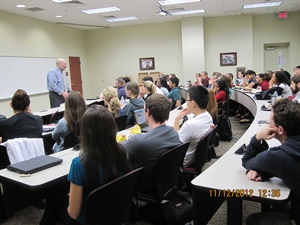
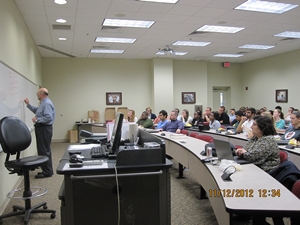
Charles R. Mathews Geriatrics Education and Research Scholarships

Their research project, Assessment of Chronic Pain Curriculum in Florida Medical Schools, was advised by Center Director Marshall Kapp and assisted by Suzanne Baker, M.A. Research Program Director in the Department of Geriatrics. The results will be published in Florida Public Health Review, 2017; 14, 22-32. To view the article, click here .
On October 25, 2016, Wyndham Bonett and Katherine Perdomo presented their research at a HALO event on Prescribing Opioid Pain Medications.
On August 5, 2017, Wyndham and Katherine presented their research at the Florida Geriatrics Society 28th Annual Meeting & Educational Symposium.
External Links
- Health and Law Organization , College of Medicine student interest group
- Health Law Society , College of Law student organization
News and Events
- HALO's newly elected 2016-2017 officers. See photos below:
|
Collin LambaPresident |
Shawn McCullough |
Clayton RooksTreasurer |
Student Writing Competitions
- 2017 Mollie and Paul Hill Student Writing Competition
Elizabeth Booker Houston of The University of Memphis—Cecil C. Humphreys School of Law has been selected as the winner of the 2017 Mollie and Paul Hill Student Writing Competition in the Law Student category for her submission, Medical-Legal Partnerships: A Step Toward Interdisciplinary Care and the Reduction of Wasteful Treatment. (Click submission title to read.)
The Center for Innovative Collaboration in Medicine and Law which sponsored the competition would like to congratulate Ms. Houston for her fine essay on medical-legal interprofessional collaboration. The Center would also like to thank all the students who submitted essays for the competition.
- HALO's newly elected 2015-2016 officers. See photos below:
|
|
|
|
- The Center recommends student participation in the Florida Gubernatorial Fellows
program. This non-partisan program immerses students from public and private universities in key areas of state government. During a nine-month tenure in Tallahassee, Fellows receive advanced on-the-job training as well as an invaluable front-line view of the inner workings of government. To learn more, please visit the website at www.FloridaFellows.com
.
- On Thursday, March 6th 2015,The FSU College of Law student Federalist Society hosted Professor Josh Blackman as he presented "Unprecedented: The Inside Story of the Constitutional Challenge to Obamacare". Prof. Marshall Kapp offered commentary.
- On January 22, 2014, the FSU Health and Law Organization (HaLO) presented and moderated the "Affordable Care Act Panel Discussion" co-sponsored by the Business and Medicine interest group (BAM) and the Surgery and Anesthesiology Interest Group (SAIG). The event, a student-driven conversation on the Affordable Care Act, included panelists: Tamara Demko, JD, MPH, Marshall Kapp, JD, MPH, John Katopodis, MD, Daniel Van Durme, MD, and William Weissert, PhD. The discussion was recently selected as "Event of the Year" by the FSU Medical Student Council. Further reading
- On February 26, 2013, the Health Law Society, AIRR, and PILSA co-hosted a speaking event about the intersections between the Affordable Health Care Act (AHCA) and immigration. FSU's Dr. Rodriguez and FSU Law's Professors Annino and Kapp discussed how undocumented immigrants fall through the cracks, even under AHCA. The discussion also explored how some hospitals in Florida and Arizona have started repatriating undocumented immigrants who require expensive, long term health care back to their countries of origin, sometimes against their will.
- On February 8, 2013, HALO and PIG hosted a presentation by Deborah Moore, Director of the Second Circuit Guardian ad Litem program. Photos are below.
- On January 22, 2013, at noon Professor Kapp and Dr. Van Durme spoke on the Affordable Care Act sponsored by the COM Florida Rural Health Association, Geriatrics Interest Group, American Medical Students Association, and HALO. View the flyer [pdf], photos are below.
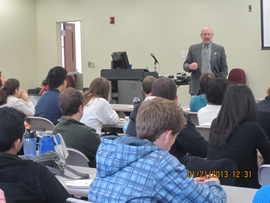
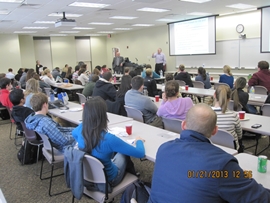
- On January 10, 2013, Professor Kapp and Dr. Les Beitsch held a brown bag lunch discussion on "Firearms Regulations as a Public Health Issue: Lessons from the Newtown Tragedy." Several faculty and students attended, and the event was covered by WCTV. Read the coverage by WCTV .

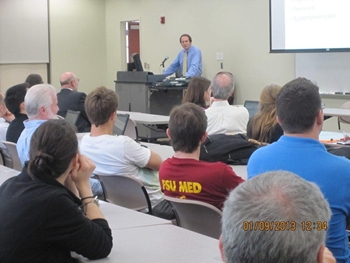
- Professor Kapp spoke on the Affordable Care Act to a meeting of the FSU College of Law student American Constitution Society on September 20, 2012at 12:30PM in COL Room 102.
|
|
|
|
|
|
- HALO met on October 25, 2011 at 5:30 PM in Room 1306. Their guest speaker was David H. Abrams, J.D., R.N. [pdf]. Abrams spoke about his representation of patient Samantha Burton in the local 2010 case [pdf].

Potential Law Student Pro Bono Graduation Requirement Project
The Need to Educate Florida’s Traffic Court Judges about Driving Rehabilitation Specialists
There is an increasing number of senior drivers in Florida, an unknown number of which have already outlived their ability to drive safely. A recent study showed that seniors are likely to outlive their ability to drive by seven to 10 years. However, along with accumulating years comes the concept of aged heterogeneity, or the phenomenon that, as people age, we become more different from each other than when we were younger. This concept is behind the fact that age-based testing for driving safety is neither cost effective nor effective in determining which seniors are safe drivers. This affects traffic court judges’ decisions, as judges are not taught how to assess a person’s driving abilities.
This uncertainty often results in revocation of licensure. However, the loss of the driving privilege can have serious effects on the former driver’s ability to obtain needed goods and services as well as on quality of life issues. Former drivers may be unable to go to the doctor’s office, pick up prescriptions, and/or visit with friends. Without transportation alternatives, a number of former drivers become stuck in their homes and are at-risk for premature institutionalization.
In 2009, the Florida Department of Transportation (FDOT), through their Safe Mobility for Life Program in the State Traffic Engineering and Operations Office, reached out to the Pepper Institute on Aging and Public Policy at FSU to establish a statewide coalition to address the specific needs of Florida’s aging road users. The Coalition has more than 25 organizational members who were tasked to create a strategic plan to address these needs. Ten Emphasis Areas (EA) were formed to examine issues from different perspectives: One of the EA is the Assessment, Remediation and Rehabilitation Emphasis Area.
Certified Driver Rehabilitation Specialists (CDRS), the majority being occupational therapists, are fully trained to assess a person’s driving ability and, in many cases, provide interventions that would enable the person to drive safely for a longer period of time. If unable to continue driving safely, CDRS make referrals to ensure the former driver’s transportation needs are met, thereby assuring continued access to needed goods and services. However, few traffic court judges are not knowledgeable about CDRS services and, therefore, referrals from traffic court judges are relatively rare.
The purpose of this project is three-fold: 1) Determine what are other states’ practices with regard to traffic court judges and referrals to CDRS; 2) Develop an educational program to inform Florida’s traffic court judges about CDRS services to promote referrals; and 3) To implement this educational program for Florida’s traffic court judges (and, ultimately, to promote correct decisions regarding retaining or revoking licenses).
http://www.safeandmobileseniors.org/FloridaCoalition.htm#Strategic_Plan
Professor Kapp's College of Law Courses:
Public Health Law
This course offers an overview of basic concepts and principles in public health law, examined in the context of issues such as government planning for natural and manmade disasters, mandatory immunization programs, mandatory medical screening of particular population groups, mandatory disease reporting laws, infectious disease control methods like quarantine, public health research, and regulation and litigation concerning tobacco, alcohol, firearms, and drugs with abuse potential. The focus will be on identification and analysis of the duties, powers and limits of government in its pursuit of protecting and promoting the public’s health.
Health Care Financing
This course offers historical and contemporary perspectives on the legal and policy issues presented by various approaches to providing and paying for access to health care in the United States. The course will focus on the legal and policy aspects of private health insurance, public health care financing programs (including Medicare, Medicaid and the Veterans’ Affairs health care system), and managed care. It will also cover legal obligations to provide and/or pay for certain medical services imposed by federal and state laws. Special attention will be devoted to analyzing selected facets of federal health reform legislation.
Health Law and Policy
This course is a study of legal issues relating to the organization and delivery of health care services in the United States. Topics examined may include: regulation of health care professionals and organizational providers, including the setting and enforcement of standards of care and the imposition of liability; regulation of relationships and duties among the parties involved in health care delivery; bioethical aspects of the provider/patient relationship; the impact of health care financing arrangements on the delivery of health care; and the development of health policy.
Prerequisites: None
Health Reform Seminar (3 credits)
The health care enterprise consists of an array of services and products intended to prevent, diagnose, treat, and conduct research on medical ailments. This enterprise encompasses preventive interventions, acute and chronic diagnostic services and treatment delivered in both inpatient and outpatient settings, biomedical and behavioral research, institutional and community-based long-term care, and mental health and addiction services. The American health care enterprise consists of participants drawn from the governmental, private not-for-profit, and proprietary (for-profit) sectors. The primary, tripartite goal of the health care enterprise is to deliver high quality health care services that are affordable and accessible to the public. This seminar will explore the ways in which recent federal and state legal and programmatic developments, as well as initiatives mounted by private actors (such as insurance companies, health care corporations, and employers), are likely to impact the accomplishment of the quality/affordability/access goal. At the federal level, main emphasis will be placed on the Affordable Care Act and the American Recovery and Reinvestment Act. Following several class sessions during which students will discuss background material, the bulk of the seminar will consist of students preparing individual written papers on topics of their selection and making class presentations based on those papers.
Prerequisites: None
Medical Malpractice (2 credits)
This course examines the broad array of legal and policy-related issues arising out of litigation seeking redress for harms in the context of the provision of medical services.
Prerequisites: None
Highlighted Curricular Activities
- Juliana Matthews, MS2 and Carly Souther, LS3 discuss their research project on the POLST (Physician Orders for Life Sustaining Treatment) paradigm in Florida. See photo below.

- "Professor Kapp lectures on Clinical Ethics in the Doctoring 101 course on August 2, 2011."
- Medical-Legal Partnership
The Medical-Legal Partnership, a collaboration between the Florida State University Colleges of Law and Medicine, is an innovation in interdisciplinary education. Law students partner with medical students, social work students, lawyers and physicians to examine patients’ social determinants of health. Students work inter-professionally to ascertain the best methods to resolve the health and related legal problems of impoverished patients. Each semester, eight law students meet with potential clients at the Neighborhood Health Services, and tackle the disability rights and immigration cases that the clients present. The effort combines service learning education with collaborative approaches to holistic problem solving for indigent individuals. Clinical Professor Wendi Adelson directs the Medical-Legal Partnership.
During Spring Break 2012, the Medical Legal Partnership went to Immokalee, FL for an immersion experience into the lives of migrant farm workers. One student, Sara Mangan, reflects on her experience in the June 2012 Humanism Evolving through Arts and Literature (HEAL) Newsletter, which may be found here: HEAL June 2012 .[pdf]













.JPG)
.JPG)


